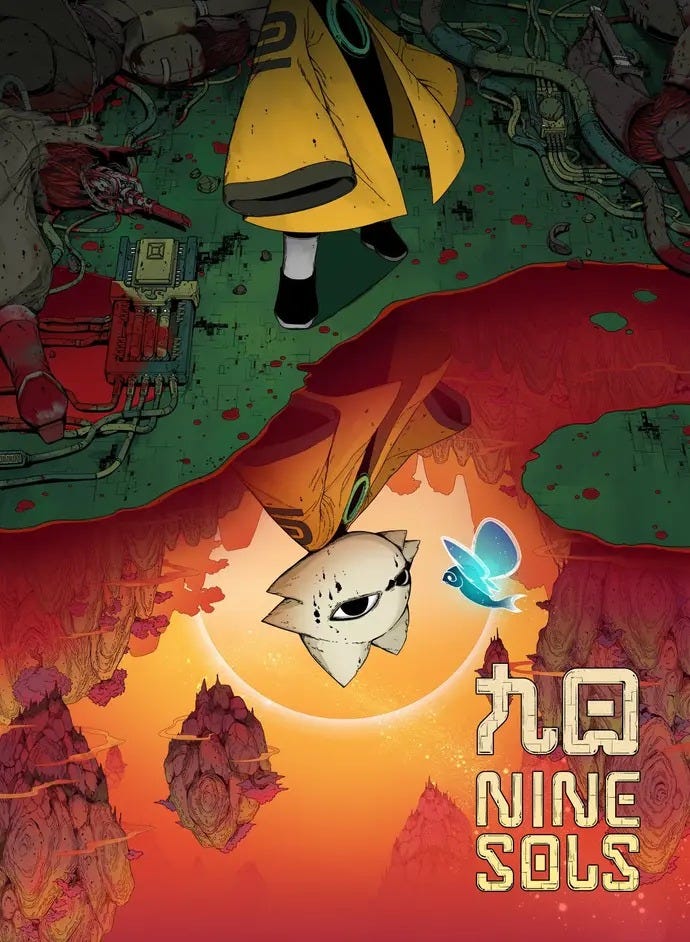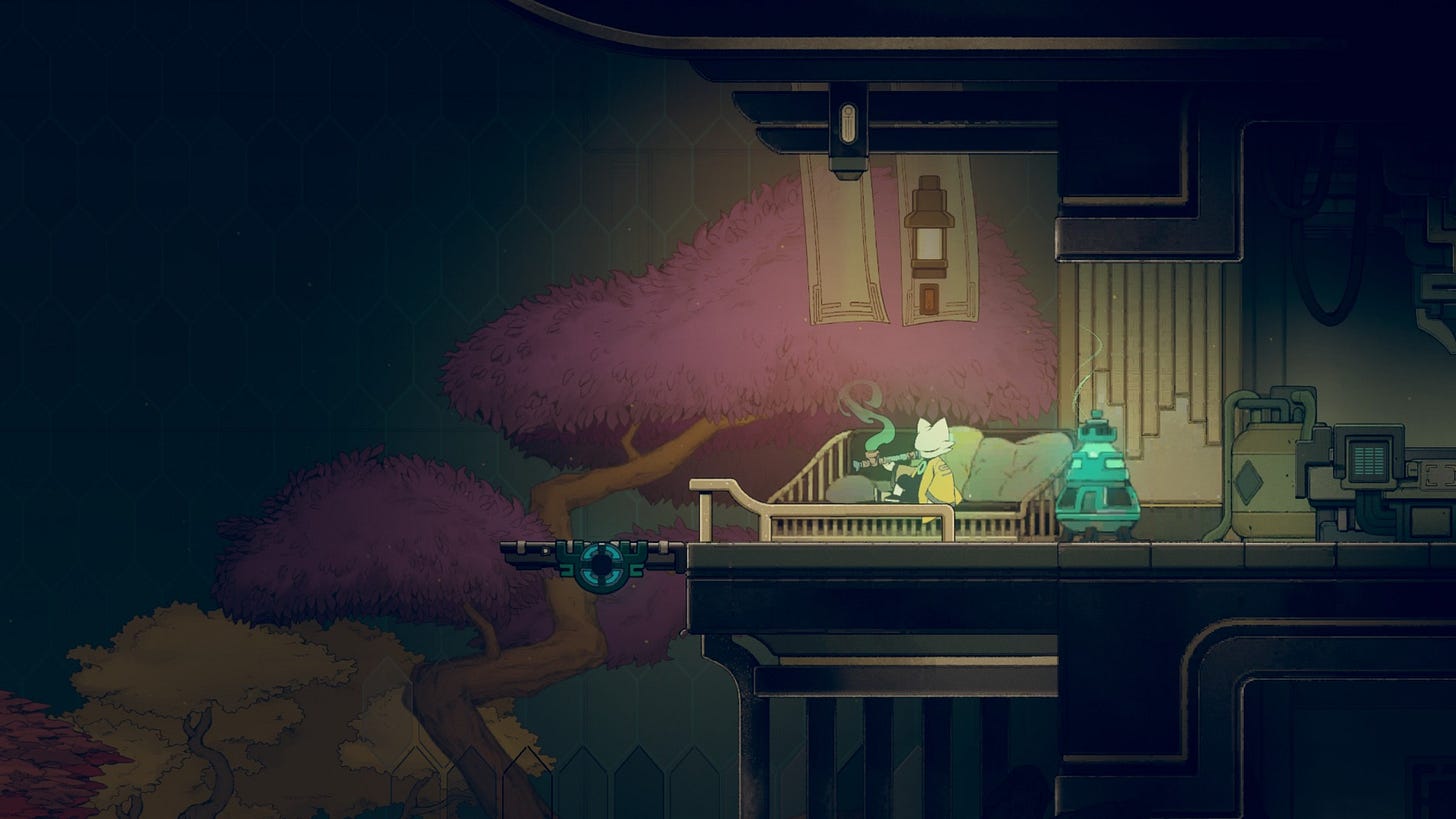Year in Review: Nine Sols
Kicking the holiday season off with a look back at some damned fine games of the year

The holiday season is upon us, the year is drawing to a close, and I’m deep in the process of moving to a new job in a new country while saying goodbye to the old ones.
So, in that spirit, I’m going to spend the next couple weeks giving quick, spoiler-free reviews of some of the games that made an impression on me this year.
Some caveats: these are not meant to be Official Reviews. They will not use Metacritic-compliant score ratings. Objective detachment does not exist in this dojo. Anyone talking about “ethics in game journalism” will be asked to leave the premises. And possibly shot thereafter.
These reviews are offered purely in the spirit of your friend saying, “Hey, I liked this thing, and here’s why. Maybe you’d like it too.” You know your friend has some weird tastes, but hey, for some reason you keep reading his nonsense.
Nine Sols (2024, Red Candle Games)

What Is It?
Back in July, in the course of a single frantic and frustrating week, I played through Nine Sols, a beautiful and brutal metroidvania-style game from Red Candle Games. It was delightful not just as a style of game I enjoy, but as a game from a studio I had never heard of, and with a style rare to find in the genre, with such beautifully- and viscerally-realized presentation that that it caught me off-guard on more than one occasion.
And in a game as challenging as this, being caught off-guard is a death sentence. I died a whole lot that week. And it was worth it every time.
What Makes It Stand Out?
Back in the day, before the explore-fight-unlock-backtrack-repeat style of game was called “a metroidvania”, they were just called “adventure” games, whether you’re talking about the original Metroid or similar games going back to Pitfall 2.
Now that the formula has been explored and refined, these games are thick on the ground on every platform. And even though I enjoy the genre’s broad process of searching for secrets across open worlds and unlocking new abilities that change how I look at the world, it takes a lot to make a metroidvania game stand out these days.
One thing that doesn’t make one stand out from its companions is by mixing in the delicate balance of technically-challenging combat and brutally unfair boss fights that are now calling cards of the “soulslike” genre of games. And sure, I think the genres work together like chocolate and peanut butter, but the combination has become ubiquitous. There’s a deep and dark ocean of soulslike metroidvanias (soulstroidvaniae?) out there, usually pale and gothic as a drowned corpse in their aesthetic, as seen in games from Salt & Sanctuary to Blashpemous to Grime.
And while Nine Sols is no less grim at times, it’s delivered in a completely different flavor. And sometimes, that makes all the difference.
The story is very much a wuxia tale, the Chinese genre of “mystic martial arts and exaggerated historical drama”. Except rather than a past historical era, Nine Sols takes place in a science-fiction setting where you're one of a race of alien cat people (the titular “Sols”), taking vengeance against the corrupt council of governors who betrayed you and their society. The studio calls this setting "Taopunk" — because marketers are forever looking for new descriptors to add “-punk” to (so as to further defile the meaning of a word that once defied the entire concept of marketing).
Silly names aside, it's a fantastic twist on a familiar genre, embracing traditional core philosophical themes of the genre (the Taoist search for balance in nature rather than control over it, the Confucian battle between respect for authority and the need to oppose corrupt authority), all while giving enough sci-fi reskins for its political themes to make it feel understandable for wider audiences.
I’m sure a more learned scholar of the philosophies and genre could find treasures by plumbing its depths. Obviously, it's a flavor of story that you so rarely see in games today, and executed wonderfully both in presentation and in gameplay.
What Does and Doesn’t Work?
The whole tale is told in a smoothly animated 2D-with-3D-elements style, with hand-drawn comic sections for cutscenes, which give gorgeous nuance to major moments in ways that brought me to tears more than once. But that beauty contrasts with both the game’s horror — both in some of its villainous concepts and in a surprising degree of messy viscera in some of those illustrations. This is a game that opens with a warning about gore, and it's not kidding around — you shouldn't play this if you've got a sensitive stomach.
Gameplay-wise, it's punishingly difficult in the soulslike fasion. Specifically, the 'souls that it’s like is Sekiro, with the combat being very parry-and-counter focused. It’s a lovely touch that perfect parries result in the iconic cymbal clash of Chinese opera, because you're going to be parrying and hearing that a lot. In fact, as later enemies strike with multiple attacks that can only be parried, that cymbal clash becomes a vital way to recognize the rhythm of the fight and how to proceed.
Even on the standard difficulty, it's one of the most challenging games I've ever played, with most bosses having two or more stages, and increasingly complicated moves and counters that sometimes left my hands cramping after a string of losses to later bosses. This difficulty could be a turn-off for gamers who aren’t looking for that sort of punishing challenge, or who simply don’t have the reflexes or time to face it. And I’ll admit, I finally reached my own limit after pounding my head against the final boss for two hours straight.
Mercifully, there is a "story" difficulty that allows you to fine-tune incoming and outgoing damage multipliers, which can be set to extremely forgiving limits and which do not prevent seeing the “true ending”, making even the final fights accessible for most players.
What’s It Saying?
On the surface level, it’s a fairly familiar story about the danger of unchecked power and the corruption of attempting to control everything in life for the benefits of an elite few. A familiar theme for both wuxia and science fiction in general, certainly.
But there's also a deeper level about this game as art and statement that can't be ignored.
See, Red Candle Games is located in Taiwan, and their previous game angered the Chinese government for including references to Winnie the Pooh -- a common way of mocking China's president Xi Jinping. Now, they're telling a story about a lone hero violently opposing a corrupt government. Doing that from a small island lying right in China's jaws is no small act of courage, in a way that few western game studios have ever had to face. That'd be worth celebrating even if the game and that story weren't so beautifully and expertly made.
Who’s It For?
Nine Sols is a prime example of the metroidvania+soulslike genre, suitable for any aficionado of the form who wants to put their skills to the test. It’s also a compelling story in a style rarely seen in games that reach the west, and a must for anyone who enjoys wuxia and/or science fiction.
Don’t let the cute cat people in the images give you the impression that this is a cute game for kids. You will see the innards of most of those cat people. You will literally wade through their blood. There’s at least one jump scare that had me cursing at my monitor and taking a walk to calm down. This game is not for the faint of heart.
But damn if it’s not a game I’m glad I played. Even if it did damned near kill me.







I did some searching online for a game that is placed in a specific contemporary urban or suburban setting (such as Washington, DC or Hagerstown, Maryland, or San Francisco, California...or Amsterdam in the Netherlands) WITHOUT some fantastical Governmental or crimebusting plot. I think it would be interesting to have situations like finding out that someone has broken into your car, or dealing with an aggressive panhandler or evangelist; finding out that your local bank has made a mistake and failed to credit your account, resulting in overdrafts; losing your heat in the winter; getting a steady stream of spam phone calls; a leaky roof; unexpected road closures...with just enough exaggeration for comic effect. You could, if desired, appeal to magical beings and dieties, but they would usually either tell you that your problem wasn't in their department, or cast a magic spell that didn't work. Better yet, the magic spell could merely compound the situation. Your character could even play the part of someone who always casts their vote for a losing candidate. It would be fun to see more realism in games.